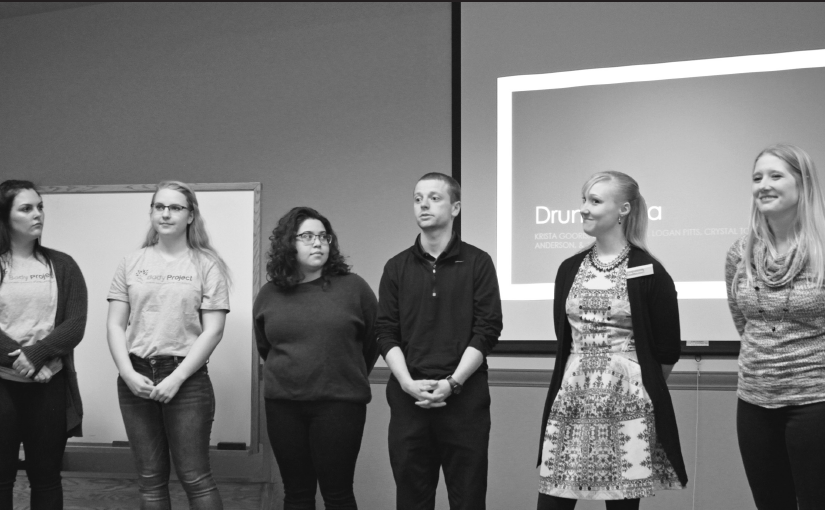Six North Dakota State students gathered to give a talk about ‘drunkorexia’ as a part of Women’s Week Tuesday, Feb. 27. Krista Gooris, Cole Petersen, Logan Pitts, Crystal Towers, Hayden Anderson and Amber Dunlap each talked about specific portions of the presentation in correlation to their knowledge.
Drunkorexia is when someone avoids food all day because they know they will be drinking at night to avoid any extra calories, get drunk faster or to get to the same level of drunkenness without having to buy as much alcohol. It is also used to categorize those who drink until they vomit on purpose or over exercise the day of or after drinking.
Although “drunkorexia” is a slang term and is not currently considered a medical diagnosis, students felt the need to bring awareness to it because of its prevalence amongst college-aged people.
Petersen, from the Alcohol and Drug Abuse Prevention Program, started by asking the audience, “Why would someone want to participate in behaviors like drunkorexia, or if they feel like they need to?”
Answers from audience members, both faculty and students, included wanting to avoid gaining weight, peer pressure, wanting to be like friends, lack of money for alcohol and a faster way to get drunk.
With her experience as a peer leader for The Body Project, Dunlap compared drunkorexia to eating disorders. “Drunkorexia is more common in those with a distorted self-perception; they have unrealistic body standards,” Dunlap explained.
The dangers of drunkorexia are that people tend to move past the “buzzed stage.” This is the stage where people are talkative, socializing and having fun. By not eating, you practically skip this phase and move onto the negative consequences of a blackout, slurred speech, mobility, etc. Many do not realize that five or more drinks in a two-hour time frame is considered binge drinking. Towers, who is a part of the Alcohol and Drug Abuse Prevention Program, explained that your “body can metabolize through its liver about one standard drink per hour.”
The Body Project peer leaders, Dunlap and Anderson brought up the three most common eating disorders, anorexia nervosa, bulimia nervosa and binge eating disorder. They correlated the symptoms and reasons for these disorders to “drunkorexia.”
Dunlap followed this by asking the audience, “How are individuals with these disorders more suceptible to drunkorexia?” The audience then gave answers such as, people with Bulimia might self-induce vomiting to speed up the process overall, contributing to that eating disorder; binge eating and binge drinking both incorporate the act of binging and eating disorders are linked to depression, therefore allowing alcohol to be a depressant.
Gooris, the Fitness and Wellness Coordinator at the Wellness Center, explained that the recovery time (hangover) is lengthened when exercising before or after drinking. She also went on to debunk the rumor that weight gain can be avoided when drinking. In reality, “Alcohol, it breaks down into amino acids, and in your digestive tract it says, ‘Ok calories and everything else I need, those amino acids first,’ so it actually stores everything that you ate or didn’t eat as fat,” Gooris said.
Pitts, a graduate student in health promotion, talked about the more nutritional side of things, saying it would be better to make positive choices and to eat moderately and healthier before drinking. Vegetables, whole grains, fruits and overall nutrient-dense foods are better choices.
They are not pushing abstinence from alcohol, but want to dispel the notion that many students think the norm is to drink. In reality, over a quarter of first-year students at NDSU chose not to drink their freshman year. Along with this, 95 percent of students say they do not feel the need to consume alcohol to have fun. If people chose to drink, the speakers want you to have a plan and recommend a drink tracking app called “What’s Your Buzz” to track your level of intoxication and find a ride if needed.
These students want people to think about yourself or a friend and how these actions that were thought to be harmless are harming the body and doing the opposite of what needs to be done. They push students who chose to drink to do it in moderation and to follow steps to prevent the ideas of drunkorexia.
If you know of anyone that is suffering from any eating disorder or drunkorexia, there is an anonymous report form on the wellness page that will allow you to get that person help without any confrontation; they assess the situation to confirm if it is a real problem or not and continue by contacting that student to take further steps to help them.
